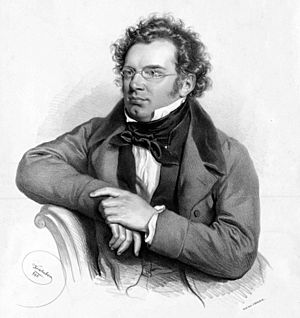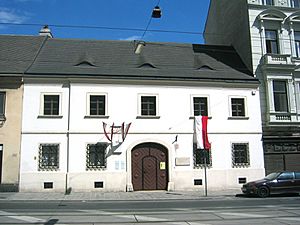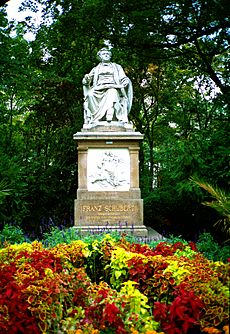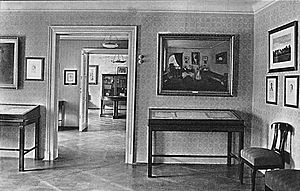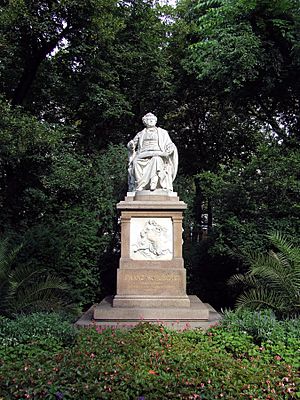Franz Schubert facts for kids
Franz Peter Schubert (born January 31, 1797, in Vienna – died November 19, 1828, in Vienna) was an Austrian composer. Even though he lived for only 31 years, he wrote more than one thousand pieces of music! Other famous composers like Haydn, Mozart, and Beethoven also lived and worked in Vienna. But Schubert was special because he was the only one born there. He is known as one of the last great composers of the Classical music period and one of the first of the Romantic period.
Contents
Early Life and Musical Talent
Franz Schubert's father was a schoolteacher. Franz was one of twelve children, but only four of them lived to be adults. His father hoped his sons would help him teach at the school when they grew up.
As a boy, Franz quickly learned to play the violin, piano, and organ. He was also a talented singer and understood music theory very well. His teachers were amazed at how fast he learned everything. He was also a good student in other subjects at school.
During holidays, Franz enjoyed playing string quartets with his two brothers and his father. He even wrote his first string quartets for them to play! By the time he was 16, he had already composed a lot of music, including his first symphony. When his mother passed away, his father remarried. Franz's stepmother was very kind to him and often helped him with money.
Becoming a Famous Composer
By age 17, Schubert was teaching at his father’s school. He couldn't join the army because he was too short and had poor eyesight. He still took music lessons from Antonio Salieri, a famous composer and teacher. Franz loved going to the opera to hear the best music of his time. He also enjoyed reading, and one of his favorite books was Goethe’s Faust.
Schubert wrote many songs. Two of his most famous early songs were "Gretchen am Spinnrade" and "Erlkönig." "Erlkönig" quickly made him famous across Europe. When it was first published, another composer named Franz Schubert mistakenly thought it was his work and sent an angry letter saying he didn't compose "that rubbish"!
Life as an Adult Musician
It was hard for Schubert to find enough time to compose while teaching. A friend named Schober convinced him to stop teaching so he could focus only on music. Soon, Schubert became well-known in Vienna's social gatherings, where he met many famous people, including musicians. These gatherings were even called "Schubertiads" because they often featured his music.
Schubert wrote so many wonderful pieces, but it was difficult to get them published. Music publishers at the time were more interested in works by performers, not just composers like Schubert. For a while, he taught music to the two princesses of Count Johann Esterházy. But he soon returned to Vienna to live with the Schober family.
During the last few years of his life, Schubert was often ill. He had to move out of the Schober's house and find his own rooms. He was often very poor and sometimes composed in bed to stay warm.
Even though Beethoven and Schubert lived in the same city, they only met once. However, they knew each other's music. Schubert visited Beethoven on March 19, 1827, when Beethoven was dying. Schubert was one of the people who carried a torch at Beethoven's funeral. Just a year and a half later, Schubert also passed away. He asked to be buried near Beethoven, and their graves ended up being only three spots apart.
Schubert's Amazing Music
Schubert wrote an incredible amount of music in his short life, over 1,500 works!
Songs (Lieder)
Schubert’s songs are considered some of the greatest ever written. They are all settings of German poems. German art songs are called Lieder (pronounced "leader"). Schubert made his Lieder very special by using the piano accompaniment to help tell the story of the song in many creative ways. It's best to hear them in German with a translation so you can understand the words. One of his most famous song cycles (a group of songs telling a story) is “Die Winterreise” (“The Winter Journey”). These songs are usually sung by a male singer.
Chamber Music
Schubert wrote a lot of chamber music, which is music for a small group of instruments. Some of his most famous pieces include several string quartets and a string quintet (for two violins, viola, and two cellos). His "Trout" Quintet is also very popular, written for piano, violin, viola, cello, and double bass. He also wrote sonatas for violin and piano, and a sonata for an instrument called the "arpeggione." The arpeggione was only used for about ten years, so today, that sonata is usually played on a cello or viola.
Schubert also composed many piano pieces, including sonatas, impromptus, and music for piano duet (two people playing one piano). He wrote eight famous impromptus.
Symphonies
Schubert wrote nine symphonies. His last one is known as the “Great” Symphony in C major. His eighth symphony is called the “Unfinished” Symphony because it only has two movements instead of the usual four. Many people still wonder why he left it unfinished. Some even think he completed it, but the last two movements were either lost or are now known as parts of a piano duet. We will probably never know for sure!
For most of his life, Schubert was supported by his friends. They often gave him manuscript paper when he couldn't afford it. Many of his greatest works only became widely known in the 1860s, long after he died. The house in Vienna where Schubert was born is now a museum that people can visit.
How Schubert is Remembered
People often felt sad that Schubert died so young, thinking about all the amazing music he could have written. An inscription on his tombstone, written by Grillparzer, says: "Here music has buried a treasure, but even fairer hopes."
Schubert's chamber music is still very popular today. The New York Times music critic Anthony Tommasini once called Schubert the fourth greatest composer. He wrote that you "have to love the guy" who died at 31, poor and not widely recognized, except by his friends who knew he was a genius. Tommasini said that just for his hundreds of songs, like the haunting Winterreise, Schubert is a central part of our concert life.
Celebrations and Tributes
In 1897, on the 100th anniversary of Schubert's birth, there were festivals and concerts around the world to celebrate his music. In Vienna, there were ten days of concerts, and Emperor Franz Joseph gave a speech honoring Schubert as a creator of art songs and one of Austria's favorite sons.
In 1928, "Schubert Week" was held in Europe and the United States to mark 100 years since his death. His music was played in churches, concert halls, and on the radio. A competition was held for new symphonies inspired by Schubert's lyrical genius. The winning piece was Kurt Atterberg's sixth symphony.
Schubert in Movies and TV
Schubert has been a character in several films, including Schubert's Dream of Spring (1931) and Gently My Songs Entreat (1933). His music has also been used in many movies. For example, his "Ave Maria" is in Walt Disney's Fantasia (1940). The second movement of his String Quintet in C major is in the film Carrington (1995).
Schubert's String Quartet No. 15 in G is a big part of the Woody Allen film Crimes and Misdemeanors (1989). His Piano Quintet in A major is featured in the 2011 movie Sherlock Holmes: A Game of Shadows. The music from his String Quartet No. 14 in D minor, "Death and the Maiden", is often used in documentaries and films, like the 1994 movie Death and the Maiden by Roman Polanski. The second movement from his Piano Trio No. 2 in E-Flat Major was used in Stanley Kubrick's 1975 film Barry Lyndon.
Documentaries about Schubert's life include Franz Peter Schubert: The Greatest Love and the Greatest Sorrow by Christopher Nupen (1994) and Schubert – The Wanderer by András Schiff and Mischa Scorer (1997), both made for the BBC.
Images for kids
-
Schubert at the Piano by Gustav Klimt (1899)
See also
 In Spanish: Franz Schubert para niños
In Spanish: Franz Schubert para niños
 | John T. Biggers |
 | Thomas Blackshear |
 | Mark Bradford |
 | Beverly Buchanan |


